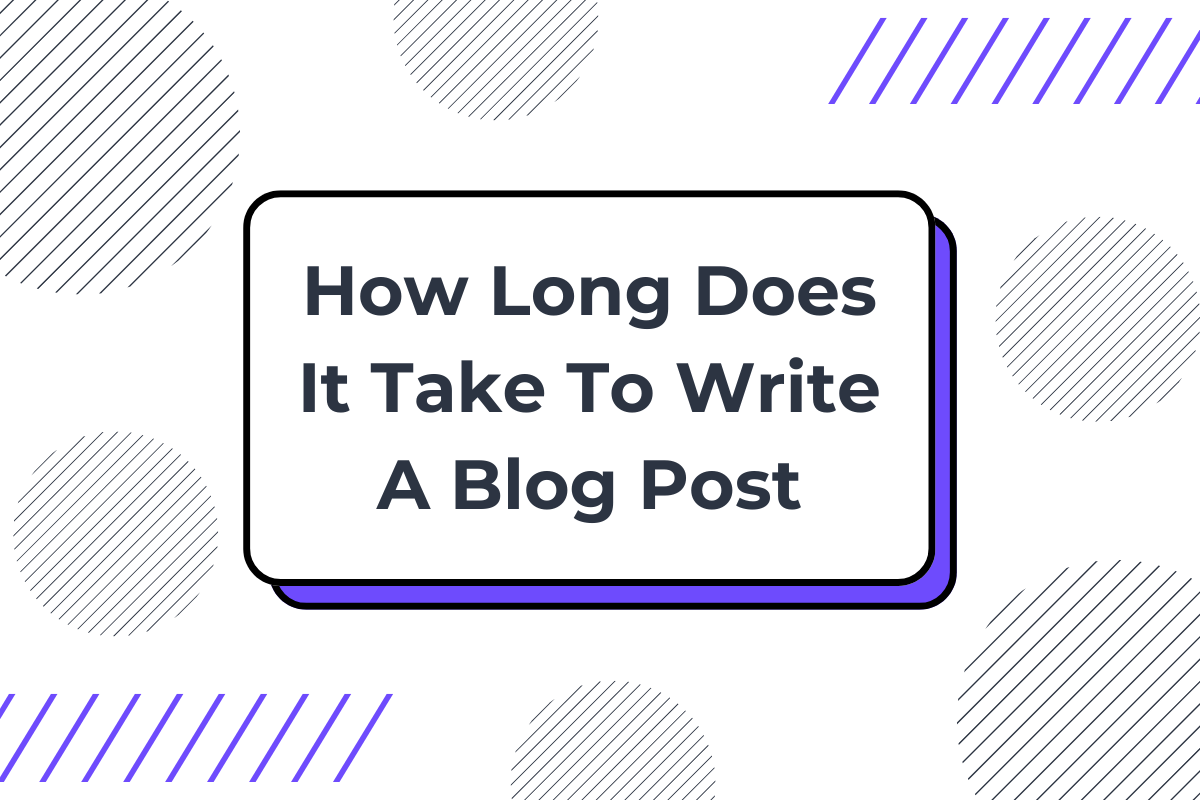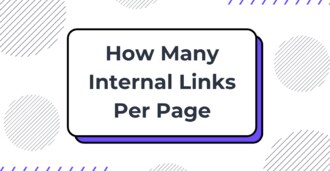How Long Does It Take To Write A Blog Post (Really)?

Blog writing time frames vary greatly depending on several factors that affect the creation process. Many content creators wonder about the average time investment needed for quality blog posts. This guide breaks down the realistic timeframes and offers practical tips to speed up your writing without sacrificing quality.
Understanding the time commitment helps you plan your content calendar more effectively and set reasonable expectations. Whether you're a beginner blogger or an experienced content creator, knowing what influences writing speed can help you make better decisions about your content strategy.
The Truth About Blog Writing Timeframes
Most bloggers take between 1-4 hours to write a basic 500-word post. However, more detailed, research-heavy posts of 1500-2000 words can take 6-8 hours or even several days to complete properly.
The time investment varies based on these key factors:
-
Your experience level
-
Content complexity
-
Word count goals
-
Research requirements
-
Editing standards
Many beginners make the mistake of expecting professional-quality content in unrealistically short timeframes. Setting appropriate expectations helps reduce frustration and leads to more consistent publishing.
Related Read: Top 10 Tips To Write Blog Posts Faster
Factors That Affect Blog Writing Time
Content Type and Depth
Different types of blog posts require varying time investments:
-
Personal opinion pieces might take just 1-2 hours since they require minimal research and draw from your own thoughts.
-
Tutorial or how-to articles typically need 4-6 hours as they require step-by-step instructions, screenshots, and thorough testing.
-
Data-driven or research-heavy posts can demand 8+ hours due to the need for fact-checking, data analysis, and expert interviews.
-
Lists and roundups fall somewhere in the middle at 3-5 hours, depending on how much background research each list item requires.
The depth of content also matters significantly. Surface-level overviews take less time than comprehensive guides that cover every aspect of a topic.
Research Requirements
Research often consumes more time than the actual writing. A post that requires extensive background reading, data collection, or expert interviews will naturally take longer to produce.
For topics you're already knowledgeable about, research might take 30 minutes to an hour. For unfamiliar subjects, expect to spend 2-4 hours just gathering information before writing begins.
Finding reliable sources, verifying facts, and compiling data all add to the timeline. This step cannot be rushed if you want accurate, trustworthy content.
Writing Experience and Skill
Your experience level plays a huge role in how quickly you can produce quality content:
-
Beginners might spend 6-8 hours on a 1000-word post as they learn the ropes of blog writing.
-
Intermediate writers with some experience can often complete the same post in 3-4 hours.
-
Professional content writers with years of experience might finish in 2-3 hours while maintaining high quality.
This skill gap explains why professional bloggers can maintain more aggressive publishing schedules. The good news is that your speed improves with practice.
Typical Time Frames For Different Blog Lengths
Short Posts (500-800 words)
These brief posts typically focus on a single, narrow topic. With minimal research needs, they can often be completed in:
-
1-2 hours for experienced writers
-
2-3 hours for intermediate writers
-
3-4 hours for beginners
Short posts work well for news updates, quick tips, or simple explanations. They're good starting points for new bloggers still developing their writing stamina.
Standard Posts (800-1500 words)
These mid-length posts form the main part of most blogs:
-
2-4 hours for experienced writers
-
4-6 hours for intermediate writers
-
6-8 hours for beginners
This blog post length allows for more detailed coverage without overwhelming the reader. Most "how-to" guides and list posts fall into this category.
Long-Form Content (1500-3000+ words)
Long-form content takes substantially more time but often delivers better search ranking results:
-
4-8 hours for experienced writers
-
8-12 hours for intermediate writers
-
12-16+ hours for beginners
These comprehensive guides often get broken into multiple writing sessions across several days. The extra effort pays off in higher engagement and better search visibility.
The Complete Blog Post Writing Process
Understanding the full process will help you know why blog writing takes the time it does. Here's a breakdown of each stage:
Planning and Outlining (10-20% of total time)
Before writing begins, you need to:
-
Identify your target keyword
-
Research the topic thoroughly
-
Create a logical structure
-
Outline main points and subheadings
This foundation-setting stage prevents writer's block and keeps your content organized. Spending 30-60 minutes here saves hours of rewriting later.
Writing the First Draft (30-40% of total time)
The initial writing stage involves:
-
Expanding each section from your outline
-
Getting your thoughts on the page
-
Focusing on content flow rather than perfection
-
Adding relevant examples and details
This stage takes the largest chunk of time - about 1-3 hours for a standard post. The goal is completion, not perfection.
Editing and Refinement (20-30% of total time)
After the draft comes the critical refinement process:
-
Checking for logical flow and structure
-
Tightening sentences for clarity
-
Removing unnecessary words
-
Fixing grammar and spelling issues
Many writers find that proper editing takes almost as much time as drafting. For a 1000-word post, expect to spend 45-90 minutes on editing.
Formatting and Visual Elements (10-15% of total time)
The final preparation includes:
-
Formatting and adding subheadings for scannability
-
Breaking up text with bullet points
-
Inserting relevant images
-
Creating custom graphics if needed
This stage adds 30-60 minutes but drastically improves readability and engagement.
SEO Optimization (10-15% of total time)
Before publishing, you need to:
-
Optimize title and meta description
-
Check keyword placement and density
-
Add internal and external links
-
Review for featured snippet potential
This 20-40 minute investment helps your content get found after all your hard work.
Ways To Speed Up Blog Writing Without Compromising Quality
While quality content takes time, these strategies can help enhance your process:
1. Create Detailed Outlines
Spending extra time on thorough outlines reduces writer's block and keeps you focused. A 15-minute outline can save an hour of staring at a blank page.
Your outline should include:
-
Main headings and subheadings
-
Key points for each section
-
Data or examples you want to include
-
Sources you'll reference
This roadmap makes the writing process much more efficient.
2. Batch Similar Tasks
Task-switching eats up valuable time. Try batching similar activities:
-
Research multiple posts in one session
-
Write several drafts back-to-back
-
Edit multiple posts during dedicated editing time
-
Create graphics for several posts at once
This approach reduces startup time and helps you maintain focus.
3. Use Templates For Common Post Types
For recurring formats like listicles, tutorials, or case studies, create templates with standard sections pre-filled. This can save 30-60 minutes of setup time per post.
Templates might include:
-
Standard introductions and conclusions
-
Section frameworks
-
Common transition phrases
-
Call-to-action formats
These structures help you hit the ground running with each new post.
4. Schedule Distraction-Free Writing Time
Interruptions dramatically increase writing time. A post that takes 3 hours of focused work might stretch to 6 hours with constant distractions.
Try:
-
Blocking social media with apps like Freedom
-
Setting your phone to Do Not Disturb
-
Working during your peak concentration hours
-
Using the Pomodoro Technique (25 minutes of focused work followed by a 5-minute break)
Many writers find they can cut writing time by 30-40% simply by eliminating distractions.
Realistic Expectations For Different Bloggers
Hobby Bloggers
If you're writing for fun or as a side project:
-
Aim for 1-2 posts per week at most
-
Allow 4-6 hours per post
-
Consider shorter formats initially
Your limited time means focusing on quality over quantity. Even posting once weekly consistently builds audience over time.
Small Business Owners
When blogging for your business:
-
Budget 4-8 hours weekly for content creation
-
Target 1-3 posts per month depending on length
-
Consider outsourcing research or editing
Your blog needs quality content that reflects your expertise, which requires proper time investment.
Professional Content Creators
Full-time content professionals typically:
-
Produce 2-5 posts weekly
-
Spend 3-4 hours per post on average
-
Develop systems to maximize efficiency
Even professionals rarely publish daily high-quality long-form content.
How Tools Can Help Speed Up Blog Creation
The right tools can significantly reduce blog post writing time without compromising quality.
AI Writing Assistants
AI tools now help with:
-
Generating outlines based on keywords
-
Overcoming writer's block with suggestions
-
Checking grammar and readability
-
Creating content variations
These tools don't replace human creativity but can cut writing time by 30-50% when used effectively.
SEO Writing Platforms

Specialized SEO writing platforms like SEOWriting make the content creation process much faster by combining multiple functionalities. This platform allows you to create SEO-optimized blog posts with a single click, saving hours of manual keyword research and optimization.
The platform includes features that handle many time-consuming aspects of blog creation:
-
Auto-generating SEO-friendly content structures
-
Creating internal linking strategies automatically
-
Suggesting NLP keywords for better search ranking
-
Formatting blog posts with proper headings, lists, and tables
-
Generating AI images to accompany your content

Using such specialized tools can reduce a 6-hour blog creation process to just 1-2 hours while maintaining or even improving quality.
Final Thoughts
Blog writing time frames vary widely based on experience, content complexity, and post length. Beginners should expect to spend 4-8 hours on a quality 1000-word post, while experts might complete the same in 2-4 hours.
Rather than rushing to meet unrealistic deadlines, focus on developing systems that improve your efficiency over time. The investment pays off in better content that resonates with readers and ranks well in search engines. Remember that even professional bloggers rarely publish high-quality daily content. Consistency matters more than frequency.
If you're looking to speed up your content creation while maintaining quality, tools like SEOWriting can dramatically reduce the time needed for research, writing, and optimization.
With features like one-click SEO content generation and automatic WordPress posting, you can focus your time on creative aspects rather than technical details. Try it for free now!



Write 10X Faster With AI-Powered Content
Create SEO-optimized articles in 15 minutes instead of 5 hours. Join 50,000+ content creators who generate content that ranks on top positions on Google. Save up to 80% of your time while getting 2X better results.
Try for Free →
